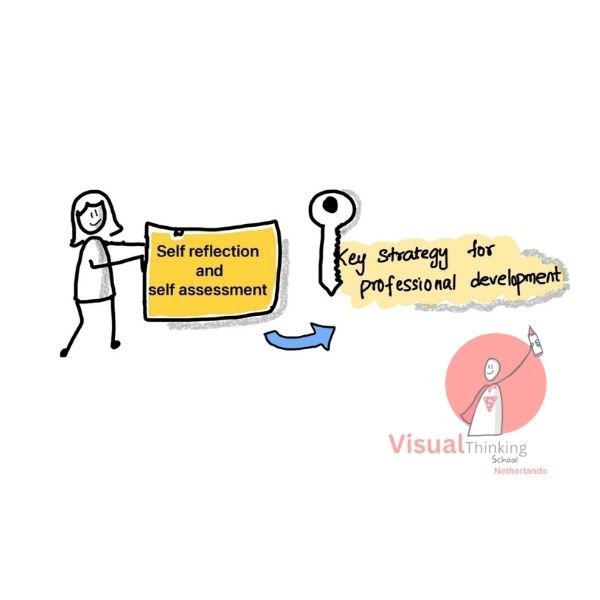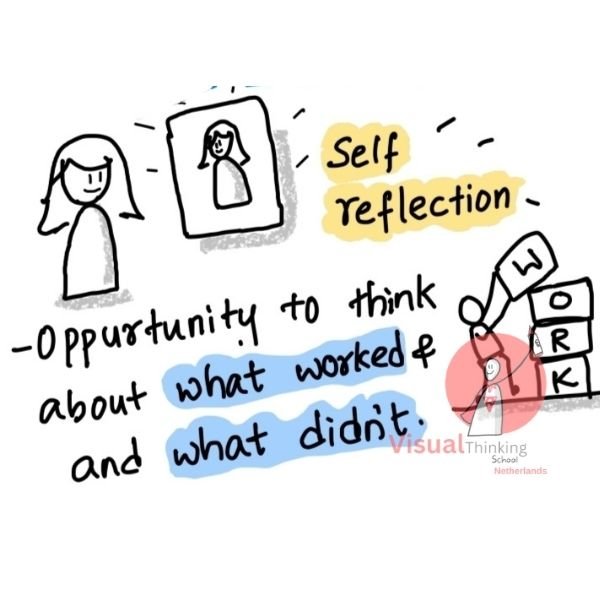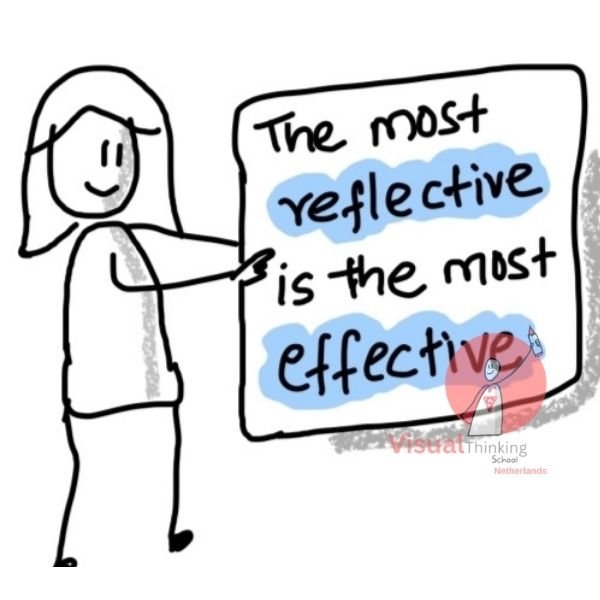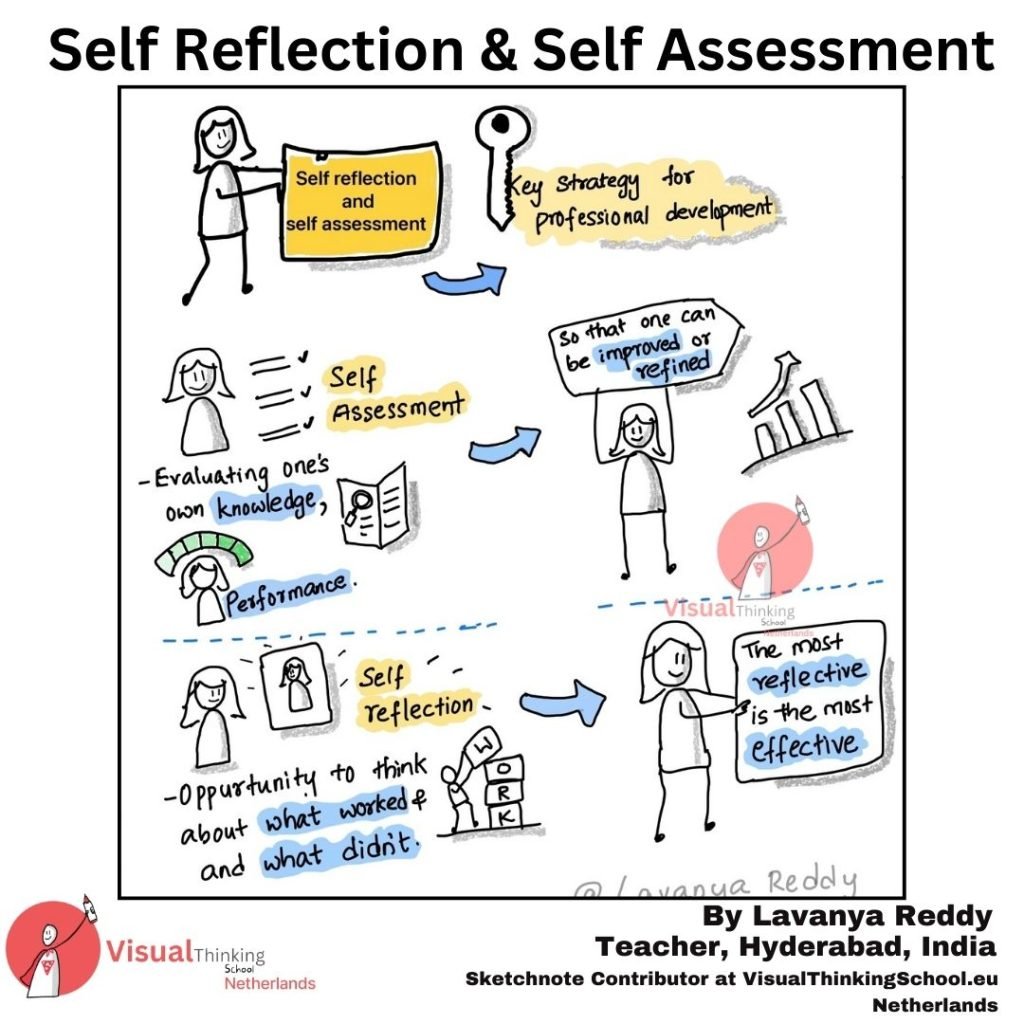

Self-reflection and self-assessment are two integral components of personal and professional growth. In today’s fast-paced world, it’s easy to get caught up in the daily grind and lose sight of our own development. However, taking the time to engage in self reflection and self-assessment can be a game-changer in advancing your career and personal life. In this blog, we will explore the significance of self-reflection and self-assessment, their definitions, and why they are essential for professional development. Let’s delve into the world of self-improvement and discover how becoming more reflective can make you more effective.

Self-assessment is the process of critically evaluating your knowledge, skills, and performance with the intention of identifying areas that require improvement or refinement. It involves a candid look at your strengths and weaknesses, allowing you to set goals for self-improvement.

Self-assessment is vital for professional development because it helps you gain clarity about your current position and where you want to be. Here are some key reasons why self-assessment is crucial:
Identifying Strengths: Self-assessment helps you recognize your strengths, allowing you to leverage them to your advantage in your career.
Identifying Weaknesses: It also helps pinpoint your weaknesses, giving you the opportunity to work on them and turn them into strengths.
Goal Setting: Through self-assessment, you can set clear, achievable goals for your professional development.
Career Planning: It aids in making informed decisions about your career path by aligning your strengths and weaknesses with your career goals.
Adaptability: Regular self-assessment enables you to adapt to changing circumstances and challenges in your profession.

Assess Your Skills: Start by evaluating your technical and soft skills relevant to your profession. Identify areas where you excel and where you need improvement.
Solicit Feedback: Seek input from colleagues, mentors, or supervisors. External perspectives can provide valuable insights.
Self-Reflection: Take time to reflect on your past experiences and projects. What worked well, and what could have been done differently?
Set SMART Goals: Create Specific, Measurable, Achievable, Relevant, and Time-bound goals based on your self-assessment.
Regular Updates: Continuously update your self-assessment to reflect your evolving skills and knowledge.

Self-reflection is the process of looking inward and examining your thoughts, feelings, and experiences. It’s a deeper exploration of your actions and their underlying motivations. Self-reflection goes beyond identifying strengths and weaknesses; it involves understanding why you think and act the way you do.
The saying, “The most reflective is the most effective,” holds a profound truth. Here’s why self-reflection is a vital component of professional development.
Improved Decision-Making: Self-reflection helps you make better decisions by understanding your values, priorities, and biases.
Enhanced Problem Solving: It enhances your problem-solving skills by encouraging critical thinking and creative solutions.
Emotional Intelligence: Self-reflection fosters emotional intelligence, allowing you to navigate workplace relationships and conflicts more effectively.
Continuous Learning: It promotes a culture of continuous learning and adaptability, which is essential in today’s rapidly changing work environment.
Increased Self-Awareness: Self-reflection leads to increased self-awareness, which is the foundation of personal and professional growth.
Journaling: Keep a reflective journal to record your thoughts, experiences, and insights.
Meditation and Mindfulness: Practice meditation and mindfulness exercises to increase self-awareness and clarity of thought.
Feedback Analysis: Analyze feedback from colleagues and superiors to identify patterns and areas for improvement.
Regular Check–Ins: Schedule regular check-ins with yourself to assess your progress and make necessary adjustments.
Learning from Mistakes: Embrace your mistakes as opportunities for growth and reflection. Ask yourself what you can learn from each setback.
While self-assessment and self-reflection are valuable on their own, their true power emerges when they are combined. Here’s how they work together:
Identifying Patterns: Self-assessment may reveal that you lack certain skills. Self-reflection helps you understand why these gaps exist and how they impact your work.
Setting Meaningful Goals: Self-reflection helps you set goals that align with your values and aspirations, making your self-assessment more meaningful and motivating.
Feedback Loop: Self-reflection allows you to absorb and apply feedback from self-assessment more effectively.
Continuous Improvement: Together, they create a loop of continuous improvement, where self-assessment informs Self-evaluation, leading to more targeted assessment.
Enhanced Self Awareness: The combination of self-awareness and reflection results in heightened self-awareness, a key driver of personal and professional growth.
Making yourself self aware and self-assessment a habitual part of your professional life requires commitment and consistency. Here are practical tips for implementing these practices into your routine:
Scheduled Check-Ins: Set aside dedicated time in your calendar for self-reflection and self-assessment. Treat these sessions as non-negotiable appointments with yourself.
Use Tools and Templates: Consider using tools like questionnaires or journaling templates to guide your reflection. These can provide structure and prompt deeper thinking.
Feedback Channels: Create an environment where seeking feedback is encouraged and welcomed. Foster open and honest communication with colleagues and supervisors.
Mentorship and Coaching: Engage with mentors or coaches who can provide guidance and support in your professional development journey. They can offer valuable insights and perspectives.
Peer Accountability: Partner with a colleague or friend who shares your commitment to self-improvement. Regularly share your progress and challenges with each other.

The Journey Towards ExcellenceIn the quest for professional development, self-reflection and assessment are not isolated tasks; they are part of an ongoing journey towards excellence. These practices, when integrated into your routine, lead to a deeper understanding of yourself, improved decision-making, and the ability to adapt to the ever-changing demands of your profession.Remember, professional growth is not a destination but a continuous process. Embrace self-reflection and assessment as your trusted companions on this journey, and you’ll find yourself becoming not just more effective in your career but also more fulfilled in your life as a whole. The path to excellence starts within, and it begins with self-reflection and self-assessment.
We conduct online and in-person certification trainings on our Trade Marked Training on Business Sketchnotes ™.
We have an open challenge in our trainings : If you can not draw after our 9 hours of trainings, we will close our trainings FOR EVER !! ..and we are still waiting for that one person even after training more than 38000 professionals.
You can also join our whatsapp community to learn from those who have attended our trainings

We trained more than 38000 professional and gave corporate trainings in more than 65+ top notch companies

Check Our Trainings

Maths educator by profession and sketchnoter by passion. She loves teaching maths using sketchnotes. She is also an acredited school sketchnote trainer with Visual Thinking School, Netherlands.
More of her sketchnotes can be checked on her Instagram: @Lavanya_anugula